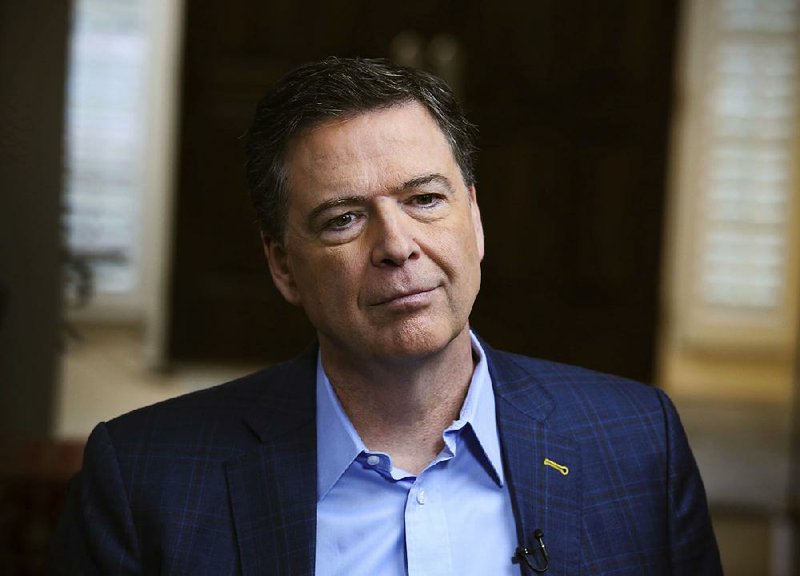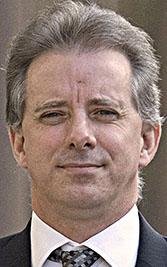WASHINGTON -- President Donald Trump said his move to declassify secret documents in the Russia investigation will ensure that "really bad things" at the FBI are exposed.
Trump on Monday declassified a trove of documents related to the early days of the FBI's Russia investigation, including a portion of a secret surveillance warrant application and former FBI Director James Comey's text messages.
The Justice Department says it's begun complying with the order, though it's not clear when the documents might be released. It's also unclear if the multi-agency review now underway might find ways to withhold certain information or limit whatever damage, such as outing sources or scaring off would-be ones, that may arise from the release.
Trump and Republican supporters want the records out in hopes they'll reveal law enforcement bias in the early stage of the Russia investigation and prove that the probe was opened without good reason.
The president tweeted Tuesday, quoting a supportive congressman and adding: "Really bad things were happening, but they are now being exposed. Big stuff!"
In a letter Tuesday to Director of National Intelligence Daniel Coats, Deputy Attorney General Rod Rosenstein and FBI Director Christopher Wray, four top Democrats called Trump's action "a brazen abuse of power."
The letter said, "Any decision by your offices to share this material with the President or his lawyers will violate longstanding Department of Justice policies." It was signed by House Democratic Leader Nancy Pelosi, Senate Democratic Leader Charles Schumer, and the top Democrats on the House and Senate intelligence committees, Adam Schiff and Mark Warner.
Trump told The Hill website Tuesday that he hasn't read the documents he ordered declassified.
In a written statement Monday, White House press secretary Sarah Huckabee Sanders said Trump had directed the Office of the Director of National Intelligence and the Justice Department to declassify the documents "at the request of a number of committees of Congress, and for reasons of transparency."
According to the statement, Trump declassified 21 pages of the 101-page June 2017 application to renew a warrant obtained under the Foreign Intelligence Surveillance Act to monitor the communications of former Trump campaign adviser Carter Page in 2016.
Those pages make up only a small part of the 412 pages of Foreign Intelligence Surveillance Act applications and court orders related to Page released by the FBI earlier this year in heavily redacted format.
The June 2017 application was the last of four filed by the Justice Department in support of court orders allowing the monitoring of Page. His communications were monitored for nearly a year starting in October 2016.
According to the redacted version, three of the declassified pages involve information included in a section titled "The Russian Government's Coordinated Efforts to Influence the 2016 U.S. Presidential Election." That section includes reference to potential coordination between people associated with Trump's campaign and the Russian election interference effort.
The other 18 pages appear to relate to information the government submitted that came from ex-British spy Christopher Steele before the presidential election. Steele was a longtime FBI informant whose Democratic-funded research into Trump ties to Russia was compiled into a dossier that has become a partisan lightning rod since its publication in January 2017.
The House committees investigating special counsel Robert Mueller's Russia probe are planning this week to interview senior Justice Department official Bruce Ohr's wife, Nellie Ohr, who worked as a contractor for Fusion GPS, the research firm that hired Steele to investigate Trump's personal and business ties to Russia.
Bruce Ohr met with Steele on several occasions to discuss Steele's findings.
The president is also declassifying all FBI reports documenting interviews in connection with the Page surveillance warrant and those documenting interviews with Bruce Ohr.
Trump also directed the Justice Department to publicly release in full the text messages of Comey, Ohr, former acting FBI Director Andrew McCabe, former FBI lawyer Lisa Page and former FBI special agent Peter Strzok that are related to the Russia investigation.
Information for this article was contributed by Chad Day, Mary Clare Jalonick, Eric Tucker and Deb Riechmann of The Associated Press; and by Karoun Demirjian of The Washington Post.
A Section on 09/19/2018



